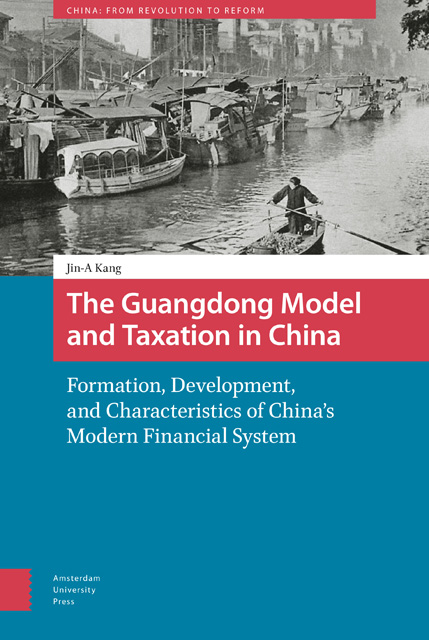 The Guangdong Model and Taxation in China
The Guangdong Model and Taxation in China Published online by Cambridge University Press: 10 January 2023
Abstract
This chapter summarizes and characterizes the fiscal trends of Guangdong province in comparison with the rest of China from the late Qing period to the Republican era before the Second Sino-Japanese War. Beginning in the late Qing, the finance of Guangdong province differed from those of other provinces in that there was the lowest proportion of land tax revenue and the highest proportion of commercial tax revenue relative to total revenue. In terms of revenue, this second largest province tapped the industrial and commercial sectors to support the expanding provincial budget. In particular, Guangdong took the lead in tapping financial resources to build modernized government-owned industries. Such potential manifested itself during Republican China, especially in the 1930s.
Keywords: fiscal reform, China, the late Qing, the Republican China, Guangdong
The late Qing era witnessed a growing awareness of the necessity for fiscal modernization as part of the modern nation-building process. Fiscal reform efforts included the introduction of a Western budget system, enforcement of indirect taxes on the industrial and commercial sectors, and a break from the dependency on a land tax. The 1898 Hundred Days’ Reform furthered discussions on financial modernization, as unfolded in the “Basic Principles of the New Policy” (Xinzheng shiji), written by He Qi and Hu Liyuan in 1898, on the necessity of a division between state and local taxes. After an aborted attempt, the Guangxu emperor ordered a compilation of the government budget for the first time in 1899. However, Sheng Xuanhuai's memorial about compiling an annual budget was not accepted by the imperial court amid the conservative atmosphere that dominated after the failure of the Hundred Days’ Reform.
The start of the New Policy reform paved the way to full-scale modernization. Zhang Jian, a prominent reformer, in his 1901 publication “Discussion on the Reform” (bianfa pingyi), counted “the creation of a budget” as one of the twelve urgent tasks for the Board of Revenue (hubu). The Finance Office (caizhengchu), an institution separate from the regular bureaucracy, was finally established by the Qing court in 1903. The first government bank acting as the public treasury, Hubu Bank, was opened in 1904, with a total capital of 4 million taels.
To save this book to your Kindle, first ensure [email protected] is added to your Approved Personal Document E-mail List under your Personal Document Settings on the Manage Your Content and Devices page of your Amazon account. Then enter the ‘name’ part of your Kindle email address below. Find out more about saving to your Kindle.
Note you can select to save to either the @free.kindle.com or @kindle.com variations. ‘@free.kindle.com’ emails are free but can only be saved to your device when it is connected to wi-fi. ‘@kindle.com’ emails can be delivered even when you are not connected to wi-fi, but note that service fees apply.
Find out more about the Kindle Personal Document Service.
To save content items to your account, please confirm that you agree to abide by our usage policies. If this is the first time you use this feature, you will be asked to authorise Cambridge Core to connect with your account. Find out more about saving content to Dropbox.
To save content items to your account, please confirm that you agree to abide by our usage policies. If this is the first time you use this feature, you will be asked to authorise Cambridge Core to connect with your account. Find out more about saving content to Google Drive.